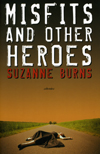Misfits and Other Heroes
A handsome former soap star, tired of his shallow, fat-free life, kidnaps a pastry chef to do his bidding. A woman, suddenly obsessed with the domestic arts, breaks into someone’s home and begins cooking and cleaning while they’re gone. We all have strange, fleeting impulses – Suzanne Burns’s characters act on them.
A handsome former soap star, tired of his shallow, fat-free life, kidnaps a pastry chef to do his bidding. A woman, suddenly obsessed with the domestic arts, breaks into someone’s home and begins cooking and cleaning while they’re gone. We all have strange, fleeting impulses – Suzanne Burns’s characters act on them.
Several of the stories center on people who, in a less sensitive era, would have been labeled “freaks.” “Triad” features a young man with a third hand growing from just below his wrist. The title character of “Tiny Ron” is just 18 ½ inches tall. The protagonist of “An Acquired Taste” falls for a woman who eats dirt, glass and coins. But as we read on, we realize that the supposedly “normal” characters are often just as freakish, if not more so, than the freaks themselves: Tiny Ron’s normal-size wife craves abuse, the fiancé of the three-handed man is in love with his third hand but not him, and the man in “An Acquired Taste” looks forward to all the attention he’ll get at the hospital when his new wife downs one too many quarters. There is no “normal”; as Lottie the coin-eater tells us, “Everyone hides things.”
Burns, who also writes poetry, tells her freakish tales with inventive, beautiful imagery, and a wicked sense of humor. In one of my favorite stories, “Tourists,” the main character falls in love with a figure from the wax museum where she works, and when she takes him with her on a trip to San Francisco he begins to melt in the sun. Burns writes, “It is hard to be philosophical when your boyfriend thaws one inch at a time.” It’s hard not to like an author who gives you a line like that.
Some of the funniest moments come in the story “Bittersweet.” Burns paints a hilarious portrait of Blake, the former soap star – he is both likable and ridiculously shallow. Musing on his relationship with Isabel the pastry chef, he thinks, “We’ll fall in love . . . but not the in and out way they do in soap operas. Ours will be substantial and real, like a Hugh Grant movie.” Isabel, whose L.A. bakery is failing, laments, “Selling one cupcake for Mary-Kate and Ashley to split doesn’t pay the bills.”
A recurrent theme in these stories is that of being seen, being noticed, having one’s existence confirmed. The protagonist of “Optical Illusion” is convinced she is becoming invisible, and craves the validation of being seen by her lover, George: “I didn’t like kissing him so much or sleeping with him, because he kept his eyes closed the whole time. And whenever George closed his eyes, I disappeared.” Later, when she discovers George has a glass eye, she takes it while he is sleeping (along with his “back-up eye”) and takes it for a joy ride. The eyes become “my blind navigators, immortally fixated on me, never even letting me down to blink.”
One can’t help but feel for Burns’s characters, many of whom are in pain; many have been abandoned or shunned. Burns makes us laugh at Olive, the woman who falls for the wax figure, and then weep for her just a few paragraphs later when she jumps off a pier after what’s left of her beloved statue:
Olive hoped to hit the water soft as the touch of melting wax. She hoped the last bits of her first love affair would greet her, a thousand bubbles skimming endearments across the water. As the flowers on her dress wilted and everything went dark, Olive hoped she knew how to rise to the surface. She hoped that someone, at least once in her life, had taught her to how to float.
A lovely example of just how freakishly talented Burns is. And I mean that in the best possible way.





